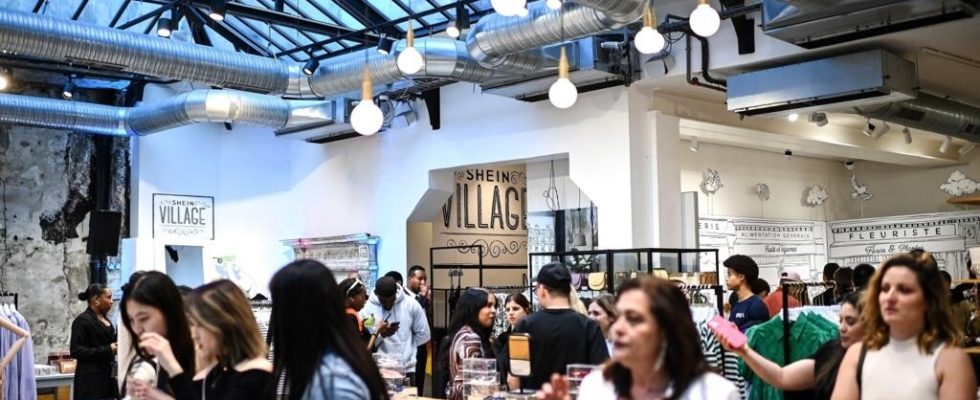In Paris, online ready-to-wear brand Shein has opened a pop-up store in Paris. Despite the social and ecological controversies, many customers responded to the discount prices, despite the case of conscience.
This is a first in the capital. After Toulouse, Montpellier and Lyon in March, for four days, the Chinese “fast fashion” brand Shein opened a store in the Marais district of Paris. And many customers got up early for a Sunday morning to come and see what the brand has to offer. ” We thought there would be fewer people for a Sunday in the rain, it’s missed! I hope it’s worth it says a young woman in line.
And when asked what attracts them to Shein, everyone replies in chorus: “ The costs ! “. ” Jeans that cost 40 euros at Zara, we will pay 15 or 20 euros here. There is a wide choice, even if we know that the working conditions are not always good, but whether it is at home or at someone else’s, is it the same thing? “retorts a Parisian in the queue. ” I wanted to see why so many young people are ordering on Shein. Fast fashion is not necessarily my way of seeing consumption. But I wanted to make up my own mind “, abounds another. The firm is not clearly not green. It’s not good, but it’s pretty much the same everywhere and we go a little above. Whether at Zara, more well-known brands. And it’s true that even if it means buying where it’s not good, you might as well buy where it’s cheaper “says a woman.
>> To read also: Textile industry: spring-waste collection
In addition to attracting crowds, Shein is the world’s leading online clothing store. In 2022, the online platform was the leading place to buy clothing for 15-24 year olds in France. In 2021, its sales jumped 60%, propelling its turnover to $ 16 billion, according to Bloomberg, thus hot on the heels of the Swedish H&M.
” Clothes under 10 euros, that raises a question »
In the queue, cases of conscience are multiplying because these attractive prices are incompatible with decent working conditions, according to several NGOs. The group is regularly accused, like other big names in textiles, of profiting from the exploitation of members of the Uyghur Muslim minority in cotton fields and workshops in the Xinjiang region in western China. Charges that the firm denies. A group of American parliamentarians also asked, on May 2, the Wall Street policeman to demand an independent investigation into the accusations of forced labor by the Uyghurs against Shein if the firm were to be listed in New York. .
” Clothes for less than 10 euros, that raises a question. There are NGOs which have effectively shown that the working hours were completely disrespectful of human rights, that there was very little leave, that it was often women who worked in appalling conditions and often far from their families. So they cannot possibly have any contact with their family, their children. These conditions are unacceptable “, explains Gildas Minvielle, professor at the French Fashion Institute and director of the Economic Observatory of the French Fashion Institute.
“A very bad impact on all consumers »
She is also singled out for having become a symbol of “ultra fast fashion”, or “the rapid renewal of collections at very low prices”. The brand is criticized by certain associations for its environmental footprint. Already that the textile represents the 5th sector the largest emitter of greenhouse gases, the industries of “fast fashion” lead to overconsumption and overproduction. They also provide garments produced quickly and of lower quality, leading to faster replacement.
>> To read also: Textile industry pollutes rivers in East Africa
And according to Greenpeace Germany, 15% of clothing sold by Shein contains toxic pollutants. Of 42 products purchased by the NGO from Shein sites in Austria, Germany, Italy, Spain and Switzerland, and five other items from a pop-up Shein store in Munich, a quarter of these products contained dangerous chemicals at higher levels. regulatory limits set by the European Union. It is mainly shoes that are subject to these overruns, notes the study of the NGO.
But despite the accusations, the firm is capitalizing on its low prices in a difficult economic context. ” There are many consumers who need low prices at a time when purchasing power is weakened “recalls the professor.
In the long term, a policy like that of the Chinese firm will have many other harmful consequences for the French consumer, who is getting used to paying less money for this kind of clothing. ” An average price like Shein’s has a very bad impact on all consumers “, warns Mr. Minvielle. ” We must not confuse the mark that consumers may have on the price, because we know that made in France where products that respect the environment or social conditions of production will necessarily be more expensive. And in the future, if we want to go for less but better, the clothes will be more expensive “, he concludes.
In an interview with AFP, Peter Pernot-Day, head of strategy and public affairs, defends Shein’s business model. ” We are on-demand manufacturers “, he retorts. According to him, the firm analyzes “ finely » the demand, which makes it possible to reduce in a way « drastic » unsold items and therefore the production of waste. Regarding dt-shirts at 4.99 euros, a price that is not compatible with decent working conditions for NGOs, he wants to “ efficiency of the model, according to Mr. Pernot-Day: “ Our costs are low because the price of a garment is weighed down by the cost of the risk of unsold items that must be taken into account and inventory management, which Shein grumbles about, the manager replies. ” Our goal is to make the beauty of fashion accessible to everyone “, he supports.
